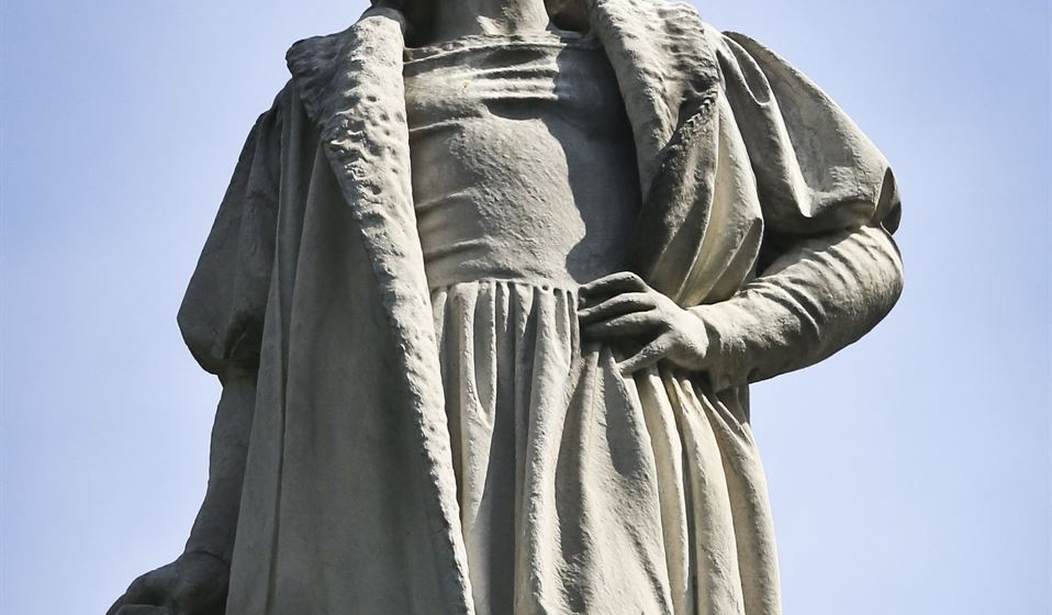The usual suspects have discovered that Christopher Columbus was no 21st century liberal. Of course, that shouldn’t surprise anyone since he lived in a time of empires, slavery, monarchies, and ignorance.
But he rose above his time and literally united the world. Without him there would be no America, no us.
Today few, if any historical figures are exempt from attack. Even America’s founders are denounced as racists and misogynists. Nor do foreigners enjoy immunity from criticism. Another Columbus Day, another opportunity for angry leftists to denounce Western imperialism, colonialism, and more.
Christopher Columbus was a man of his age, like everyone else in Genoa (now Italy, his homeland) and Spain (whose monarchs financed his ocean expeditions). He mistreated indigenous peoples, kept slaves, and governed badly. Awful, but then, not many colonial officials, explorers, ship captains, and rulers behaved differently.
We don’t celebrate Columbus for his failings, including holding once common beliefs which we rightly have come to abhor. We celebrate him for his unique, even heroic, virtues.
We celebrate him for having helped make the modern world.
The 15th Century was a challenging time. The rise of Islam and fall of Constantinople severed traditional trade routes to Asia. European monarchies battled for maritime supremacy. Geographic knowledge was advancing, but still very limited.
In this world, Columbus stepped forward. He sought a shorter route to Asia than around the Horn of Africa. So, he sought support to head west. The Spanish monarchs, Ferdinand II and Isabella I, said yes.
The rest is, as they say, history. Columbus and his crew set out with the Nina, Pinta, and Santa Maria. On October 12, 1492, they landed on the island (in today’s Bahamas) which he named San Salvador. He made three subsequent trips, and spent a few years as governor of the island of Hispaniola.
We know the criticisms. For instance, the residents knew where they were and didn’t need to be “discovered.” But Europeans needed to find them. The early Americans had no maritime tradition and would never have ventured east.
The opening yielded practical benefits: such as the exchange of new crops and domesticated animals. More important, though, Europe transferred not only its knowledge but its traditions of scholarship, invention, and innovation to the new world.
An age of commerce, exploration, and colonialism followed. Of course, it would have come at some point even had Columbus never been born. Someone else eventually would have located the New World. But Columbus’s exploits were widely noted and studied.
The consequences of discovery for indigenous peoples—conquest and disease—were at times awful. But the undisturbed residents of the Americas were not living in paradise, an unspoiled Eden. They certainly were not modern liberals. Indeed, peoples like the Aztecs and Incas turned barbarity into an art form.
Cruelty, slavery, human sacrifice—none of these were forms of indigenous culture worth preserving. There was little nobility in the savagery that was then the norm.
Columbus fell far short of what humanity demanded, but he set in motion a process which ultimately affirmed the importance of respecting the life and dignity of every person. The desire to be free—and the belief that liberty was possible—came too.
He didn’t intend most of the consequences of his voyage. In this Columbus was like most adventurers, as well as merchants, conquerors, clerics, monarchs, scientists, scholars, and others. Much human progress results from inadvertence, accident, even mistake. Still, we should learn from and appreciate people who achieved much even though their legacies were far from perfect.
And Columbus worked for his success. He came from a family of modest means. He first went to sea at age 10. He was an avid trader and self-taught scholar, who read widely. He learned geography and science, and knew history. He embodied the unique human commitment to apply and profit from knowledge.
Columbus also cared about things spiritual and believed his most important success was spreading Christianity. One can criticize how he practiced his faith and especially his failure to live up to Christianity’s tough demands in caring for “the least of these.” Still, he was a more complex person than the caricature promoted by the Left.
Columbus lived a full life, but was only 54 when he died. He saw only a small part of the world which he helped create.
Most of our traditional heroes are flawed. Like Christopher Columbus. But they still give us much to respect and admire. Tearing down those who came before us is no way to build up America.
























Join the conversation as a VIP Member